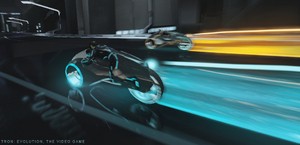
Twenty-eight years is a long time to wait for a sequel, but the follow-up film to the iconic Tron is almost upon us. One month before Tron Legacy arrives on our screens will come Tron Evolution, a game filling in some of the middle ground between both films, and Movemodo was fortunate enough to be invited to a preview event for it.
The year is 1989. It is seven years since Kevin Flynn helped free the ENCOM system from the clutches of the Master Control Program, and five years since Isomorphic Algorithms (IA) began to self-form within the network, much in the same way that life crawled out of the primordial ooze on Earth. However, while developing and evolving on its own, the system is still not in balance, nor peaceful. The plot, needless to say, is being kept fairly close to the chests of the developers, but what is known is that a viral entity known as Abraxis is attempting to take control and subvert all neutral programs to his will.

While the choice of a virus might seem obvious, the decision may be more deliberate than first assumed. The original Tron film dealt with hacking, computer networks and industrial secrets that back in 1982 were fanciful concepts, but today are commonplace hazards. Likewise, in 1989 most people would not have understood what a computer virus was, so the choice is aping, in hindsight, the same vision that the original film makers created.
Although Tron Evolution is technically a movie license game, it is a lot more closely integrated than most would be. For starters, the concept of producing a new game product was drafted shortly after the original test footage for Tron Legacy was aired at the San Diego Comic-Con in 2008. The task of creating something that lives up to the expected high standard falls on the shoulders of Canadian developer Propaganda Games.
Producer Darren Hedges understands the pitfalls of such a project. Having worked for a number of years at EA Canada on the FIFA titles, pressure, deadlines and expectations are three factors he is very much familiar with. Tron Evolution is another step above this; he explained that the 1982 film was a major inspiration for him to get into video games, and a franchise such as this deserves another quality entry to sit alongside those that have already been produced. Needless to say, the original Midway arcade machine was also a massive time sink for him.
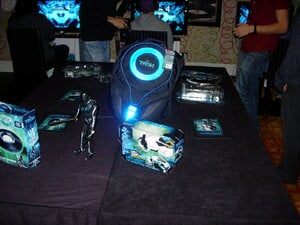
With both film and game projects working concurrently, Hedges and his team have been in an unusually unique position to influence, suggest and mould parts of the upcoming film. Likewise, Legacy director Joseph Kosinski and producer Steven Lisberger have helped define and shape aspects of the game that will be brought to life where merely mentioned in the film; while Tron City will be a consistent vision between both mediums, many of the other locations referenced in the film will only be explored within the game.
The single-player mode begins with a truce between the regular programs within the Encom system and the IAs, but there is still trouble in paradise. Flynn has written a new security monitor program (SMP) to help control the entities inside the system and deal with any trouble that occurs. You play Anon (a deliberate contraction of Anonymous), the virtual representation of the SMP, and it is your task to help defeat Abraxis. Although driven by a direct story narrative, the overall worlds you will be able to explore are promised to be free roaming and wide; while not completely sandbox-like a la Grand Theft Auto, they will be sufficiently large to allow investigation and diversion from the main objectives.
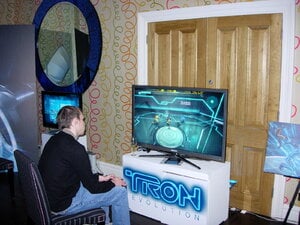
Story mode in itself combines the movement aspects of parkour, and the combat elements of capoeira, which in gaming layman terms means it will utilise features already seen in Mirror's Edge, Prince of Persia and God of War. Anon is quite nimble and can wall-run, jump high, bound around and roll upon landing, while in combat can switch between fast, fluid motions that are weaker but make him harder to hit, or look to block, parry and string long, damaging combinations together. One of the most striking aspects in Tron are the data discs, and these are a vital part of the game once again; there are a variety of different disc types to access that can deliver more damage, impact against a wider area when attacking, or temporarily stun a number of enemies.
The length of the story mode will naturally vary depending on skill level, but one of the lead programmers, Jonathan Gallina, estimates that it should last eight to ten hours depending on how much of each area is explored. Part of this variance, he says, is down to the way that the avatar developed by the player is continuous throughout the game, whether they are completing story mode or engaging in the multiplayer. Completing missions, killing enemies and performing well earns experience, and like many other games, this allows you to level up, improve your stats and gain new abilities.
The difference being that acquired experience is persistent regardless of game mode, and if you improve by several levels via multiplayer then it will then partly make the next few subsequent sections of story mode a little easier to complete by virtue of buffing up your combat ability. Hedges explains this was in part chosen because he hates the way that usually you have to develop single and multiplayer avatars as separate entities. This way, everything you do is of benefit to one character. Another reason he states is that it makes the introduction to multiplayer a little less scary for more casual gamers in that they can already earn some perks before entering the arena.
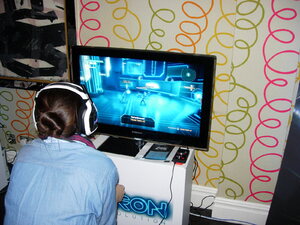
There were three games types available for playtest, those being Disintegration (both solo and team varieties), Power Monger, and Bit Runner, which roughly translates into deathmatch, area capture and avoid everyone else. Disintegration generally proved the most popular during the time spent with the game. Some arenas are small enough that only hand to hand combat is available, others are spacious and wide, allowing the transformation into light cycle for fast combat, and a couple of powerful tanks await discovery; while formidable, they can be taken down with effort and they do have blind spots, most notably directly on top.
Pulling off hit combos on other foes using your disc was enjoyable, but not as much as racing alongside another light cycle and getting them to smash into your trail, or trundling the tank along and running over helpless opponents in your path. The maps also have energy replenishment points and upgrades available but often you have to work a little to reach the latter, which, to be fair, is a fitting reward for spending the effort to get there. Similarly, learning how to block, parry and counter with the light disc will give an edge over your opponents, along with being able to quickly leap and dive out of the way.
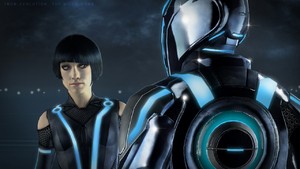
Power Monger is a different angle to the usual area capture game, as you must gain control and hold strategic points on the map to connect an electric circuit running from your base into the arena. If there is no complete circuit, then you don't score any points, meaning that for a team game you must work together properly to achieve victory. Bit Runner sees one person tagged as "it" and they must avoid everyone trying to destroy them, while all the time their health is decreasing. Definitely one for the competitive type out there, this game could prove popular over time.
All the experience accrued levels up your avatar, and with it unlocks new modifications and perks, but these must be "purchased" using the reward Megabytes that you earn from completing each match. Three loadouts are available for customisation and selection before each match, although there didn't appear to be any way to switch between them mid-game. Each loadout only allows for two disc upgrades, one perk and one light cycle choice, to which there are certainly a lot of choices available. Most upgrades also affect other aspects of your performance; for example the Heavy Disc v2 also can give your light cycle a speed boost, and equips the tank with a better cannon. This mix-and-match ability enables plenty of customisation and the ability to tailor a profile that suits your playing style.
To be honest, the only truly disappointing feature about multiplayer is that it will be online-only, with no local play at all. While the online modes won't be as popular as Call of Duty: Modern Warfare 2, multiplayer in Tron Evolution is certainly more than an add-on to the single-player experience and definitely shows promise and polish. It might also be fortunate enough to be included in the small list of movie related games that are actually good.
The last question left to Hedges: Is the original Tron arcade machine going to be a bonus extra in the game?
"I can't answer that," he states with a grin.
Our money, however, is on that fact. And there isn't that long to wait and find out.
Comments 2
This game looks cool, but i think battle grids for the wii is going to be better
I have not heard much about Tron Evolution, so it is great to get some in-depth details about it here. For example, I did not even realise it was set in '89 and that its plot covers a story thread between the films.
I don't know much about Propaganda Games either, except that they made a Turok title for PS3 and they're developing a Pirates of the Caribbean game. It's good to hear their devs have been getting stuck into Midway's 1982 arcade game.
I like that the experience you build in mutliplayer counts towards your single player progress too, but it is a shame that they were not able to include local multiplayer.
Cheers Mat, I knew next to nothing about Tron Evolution before I read this!
Show Comments
Leave A Comment
Hold on there, you need to login to post a comment...